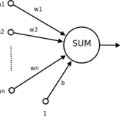We present a novel deep learning-based algorithm to accelerate - through the use of Artificial Neural Networks (ANNs) - the convergence of Algebraic Multigrid (AMG) methods for the iterative solution of the linear systems of equations stemming from finite element discretizations of Partial Differential Equations (PDE). We show that ANNs can be successfully used to predict the strong connection parameter that enters in the construction of the sequence of increasingly smaller matrix problems standing at the basis of the AMG algorithm, so as to maximize the corresponding convergence factor of the AMG scheme. To demonstrate the practical capabilities of the proposed algorithm, which we call AMG-ANN, we consider the iterative solution of the algebraic system of equations stemming from finite element discretizations of two-dimensional model problems. First, we consider an elliptic equation with a highly heterogeneous diffusion coefficient and then a stationary Stokes problem. We train (off-line) our ANN with a rich dataset and present an in-depth analysis of the effects of tuning the strong threshold parameter on the convergence factor of the resulting AMG iterative scheme.
翻译:我们提出了一种新的深层次的基于学习的算法,通过使用人工神经网络(ANNs)来加速代数多格格丽德(AMG)方法的融合,以迭代解决由局部差异等同(PDE)的有限元素分解产生的等式线性系统。我们表明,在构建以AMG算法为基础的日益缩小的矩阵问题序列过程中,可以成功地利用非正反向连接参数来预测强烈的连接参数,从而最大限度地实现AMG计划的相应趋同系数。为了展示我们称之为AMG-ANN的拟议算法的实际能力,我们考虑了由二维模型问题的有限元素分解产生的等式的代数系统的迭接式解决办法。首先,我们考虑的是具有高度混杂的传播系数的椭圆式方程,然后是定点的斯托克斯问题。我们用丰富的数据集对我们的ANN(脱线)进行训练,并对调整由此形成的AMG迭接合办法的强阈值参数的效果进行深入分析。





